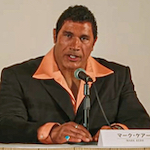 THE SMASHING MACHINE (2025) is one of those movies that comes along every once in a while that’s so geared toward my niche interests that it seems like a prank. How the fuck is there a movie where
THE SMASHING MACHINE (2025) is one of those movies that comes along every once in a while that’s so geared toward my niche interests that it seems like a prank. How the fuck is there a movie where
1) The Rock finally does what I’ve been saying he should do for years and chooses a movie based on the director, artistic merit and acting challenge rather than its potential to be the highest grossing, most universally seen and least memorable generic middlebrow cinematic porridge ever squirted out of a tube
that happens to be
2) a remake of an obscure and now impossible to find sports documentary I watched and became obsessed with because it was from the director of the greatest DTV movie of all time?
If I was stupid and dumb instead of savvy and wise this would be one of those “this proves life is a simulation” moments for me. The new version is written and directed by Benny Safdie (actor from HAPPY GILMORE 2 who directed GOOD TIME and UNCUT GEMS) and released as a hip art movie by A24. Original director John Hyams is credited as a consulting producer, and man I hope he got paid because this is entirely built on his movie.
Set in the late ‘90s and early 2000s, Dwayne Johnson (DOOM) stars as Mark Kerr, a collegiate wrestler who became a dominant fighter in the early days of the Ultimate Fighting Championship (when it was still a pay-per-view tournament pitting different styles against each other) and then in Japan’s PRIDE FC. The movie depicts in a very naturalistic, understated style the dichotomy between this primal physical activity in packed arenas and the mundane life in between. He trains, he sees doctors, he gently corrects his girlfriend Dawn (Emily Blunt, THE HUNTSMAN: WINTER’S WAR) for being out of date on his protein shake recipe. (It’s skim milk and one and a half bananas now. But it’s okay. He’ll just make another one.)
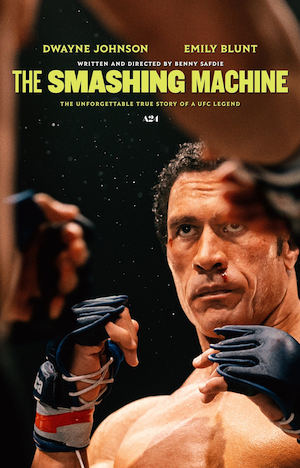 The fascinating aspect of the documentary best captured by Johnson and Safdie is the juxtaposition of Kerr’s brutal life’s work and his friendly, dorky, conflict-averse personality. He’s always smiling, talking diplomatically to Dawn and to promoters who aren’t paying him enough, and tells an opponent who may have ruined his career with an illegal move (Oleksandr Usyk as Igor Vovchanchyn) that it’s okay, it was a natural thing to do. And they take a picture together. I love the opening scene where, after annihilating his first MMA opponent, he keeps asking the ref if he can make sure he’s okay. He seems really worried about him.
The fascinating aspect of the documentary best captured by Johnson and Safdie is the juxtaposition of Kerr’s brutal life’s work and his friendly, dorky, conflict-averse personality. He’s always smiling, talking diplomatically to Dawn and to promoters who aren’t paying him enough, and tells an opponent who may have ruined his career with an illegal move (Oleksandr Usyk as Igor Vovchanchyn) that it’s okay, it was a natural thing to do. And they take a picture together. I love the opening scene where, after annihilating his first MMA opponent, he keeps asking the ref if he can make sure he’s okay. He seems really worried about him.
Johnson is noticeably bigger than the real Kerr, but obviously his physique and his WWE job skills qualify him for the role more than most actors. Still, this is his first ever chameleonic performance, doing a voice and wearing astonishing prosthetics designed by Kazu Hiro, the man who turned Joseph Gordon-Levitt into Baby Bruce in LOOPER. (Also he worked on HIRUKO THE GOBLIN, ZEIRAM, PLANET OF THE APES, THE SHAPE OF WATER, BOMBSHELL, MAESTRO and many more.) Especially after he shaves his head there are times where it looks more like Kerr than The Rock.
Like the documentary (but in much less detail) this is also the story of Kerr’s friendship with Mark Coleman (MMA fighter Ryan Bader), who acts as his cornerman before mounting a comeback himself and ending up in the same tournament. Which people expecting a traditional sports drama should probly not get too excited about. To me Bader doesn’t really capture the vibe of the actual Mark Coleman, but he does capture the vibe of an actual, no nonsense MMA professional, which is more important.
The various fighters Kerr faces are also played by real fighters (same thing Hyams would’ve done), but beloved ex-fighter and commentator Bas Rutten (SHADOW FURY) plays himself, training Kerr for the 2000 Grand Prix. This was the right choice – doesn’t matter that he’s 25 years older now, his unique charisma is irreplaceable. (And The Rock is about 20 years older than Kerr was anyway.) They’re so natural together I never thought how weird it must be for Rutten to be in scenes with a famous guy playing his friend, re-enacting things they actually went through together decades ago.
(Fellow commentator Stephen Quadros is also heard as himself, unfortunately sounding like he’s at a table reading.)
Safdie sticks to a simulated vérité and avoids expected sports drama formula, content to focus on raw performance, 16mm grit (d.p.: Maceo Bishop, The Curse) and the more-hideous-than-we-remembered fashion and furniture of the era. I’m not sure how painstaking they were but it sure gives the impression of an exact replica, with attention paid to every t-shirt logo, hideous ‘90s jock outfit, and depressingly generic furnishing in his apartment.
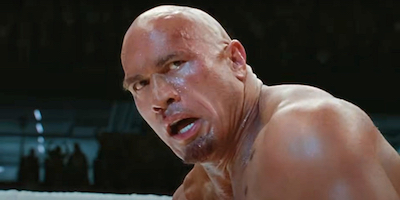 That illusion of a lack of artifice amplifies the almost mythical simplicity of the themes. His life seems very straight forward, all he wants to do is be a gladiator, pull his opponent to the mat and pound his face in until he gives up or can’t continue. He wants to win in front of a big crowd, which he compares to an orgasm, and also to a high. But the process of achieving that high, of pursuing that dream, has inevitably battered his body and he’s dealt with it by becoming horribly addicted to painkillers. He’s also gotten too cocky, can’t really imagine losing – even when pressed by a reporter he can’t come up with a guess as to how he’d handle it. So he (according to Dawn) doesn’t take training seriously, goes out and parties before a fight, leading to his first loss, which devastates him and soon he hits rock bottom and finally goes to rehab.
That illusion of a lack of artifice amplifies the almost mythical simplicity of the themes. His life seems very straight forward, all he wants to do is be a gladiator, pull his opponent to the mat and pound his face in until he gives up or can’t continue. He wants to win in front of a big crowd, which he compares to an orgasm, and also to a high. But the process of achieving that high, of pursuing that dream, has inevitably battered his body and he’s dealt with it by becoming horribly addicted to painkillers. He’s also gotten too cocky, can’t really imagine losing – even when pressed by a reporter he can’t come up with a guess as to how he’d handle it. So he (according to Dawn) doesn’t take training seriously, goes out and parties before a fight, leading to his first loss, which devastates him and soon he hits rock bottom and finally goes to rehab.
Mark and Dawn sort of work as caricatures of masculine and feminine stereotypes. He’s giant, he puts his muscles around her to protect her, he provides the money, she brings him shakes, caresses his muscles, likes to get dressed up and have a social life. He tries to be calm and reasonable while she is all emotion and chaos. The more he needs her to not be that, the less she can contain it. Much of the story here is that he needs the very simple discipline to stay focused on the next fight until it happens. Both of his trainers can clearly see that means staying away from Dawn, but they seem to stay out of it. He also starts to see that she’s a distraction from his sobriety, at times intentionally enabling him so he’ll be more fun for her. She’s a mess.
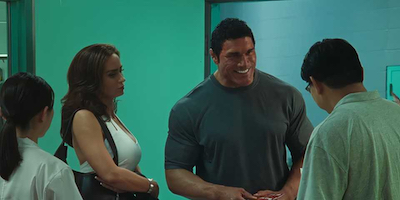 Not that he’s all neatly put together either. The way Johnson plays him there’s an unsettling effort behind that grin, like he’s using all his strength to be that gentle guy. More than once his rage escapes containment and the machine smashes a door or some furniture. From what we see in both the doc and the remake he’s never violent outside of the ring, but clearly he has an urge to pound his fists against his frustrations.
Not that he’s all neatly put together either. The way Johnson plays him there’s an unsettling effort behind that grin, like he’s using all his strength to be that gentle guy. More than once his rage escapes containment and the machine smashes a door or some furniture. From what we see in both the doc and the remake he’s never violent outside of the ring, but clearly he has an urge to pound his fists against his frustrations.
That brings up a question the movie seems to avoid: who the fuck is this guy? He’s just dropped in front of us as-is, with very little background or explanation. Even in the documentary, which talked to some of his family and friends about his childhood, no one seems to understand how he became who he is. So we either accept that he’s just an athlete doing athletics, or we wonder what sort of real violence he’s ever experienced, what kind of emotions he has in there. Maybe the addiction really just comes from the difficulty of the job. Maybe the smile is genuine and not a struggle. (That’s not something I wondered in the documentary, but I think Johnson’s performance suggests it.) We don’t know, and we don’t know if the movie knows.
Even more mysterious, though, is why Safdie remade an existing (if you can find it) documentary in the style of a documentary. The characters don’t talk to the camera like in the doc, but they’re often talking to the journalists backstage at the fights, so we get some of the information in the same way. Many of the most important scenes are adapted from scenes in the documentary: talking to the horrified lady in the waiting room at the doctor’s office (including the “Absolutely not” line), telling the Pride promoters he needs more money, the announcement and clarifications about which moves are now banned, complaining to the promoters about losing due to an illegal move and then going into a room and crying, asking a medic why he can’t have something stronger, the tearful intervention in the hospital bed (but it wasn’t Mark Coleman in real life), putting all his drugs in a bag and throwing them in a dumpster… And with the exception of the argument where Dawn goes and gets a gun, it mostly doesn’t enact stories that are told. It does transfer things said in interviews into conversations, most notably his explanation of winning in front of a crowd being like an orgasm and like getting high.
More strikingly, the movie really sticks to the same story and themes as the documentary, even though Kerr and his career existed before and after the handful of years he was followed by cameras. There are changes in emphasis, of course; in 2002 it was more necessary to explain what the sport was and what its worth was beyond shock value – now that UFC has been around long enough to be just one of the sports everybody watches (and morph into an evil corporation in league with fascists) that can be mostly skipped over.
Mark Coleman’s screentime is also reduced, which I think takes away some important context. In the documentary he can tell his story to the camera, we understand that he’s seen as past his prime and has an unexpected comeback while Kerr is in rehab. So I think it has more traditional underdog triumph than the fictionalized version. That aside, Safdie stays uncomfortably close to Hyams’ version.
The miracle of the documentary (or any documentary) is that they saw this guy was an interesting subject at this time, and that’s when they talked to him, they happened to be making the movie when he had his first loss, when he overdosed and went to rehab. They happened to have been talking to Mark Coleman and showing their relationship, so they happened to be there as Coleman’s triumphant comeback coincided with his friend’s fall. And I’m sure they were there for many other things, but they carved them out to leave these events. That was not the entire story of Mark Kerr’s life, but it was the part of it Hyams told a story about, to represent this man and this sport and these ideas.
So it feels like cheating, in my opinion, for this movie to represent those same things using these same events and this same time period. Even taking that route, why wouldn’t you want to act out some of the important events that the cameras weren’t there for, like Dawn finding him overdosed? Outside of what people say in interviews, a documentary is limited to the things they were able to be there to film. And then it conveys things to us through the order it shows the things and the ways our minds fill in the blanks. Fiction also leaves those empty spaces for us, but it’s different – in the documentary we understand that what we’re seeing is a record of reality and that the rest is our speculation. Safdie’s movie is all dramatization, so why not dramatize? Is that an illegal move now?
Consider this. When we watch the real Mark Kerr in the documentary THE SMASHING MACHINE, we see some real version of him but we’re conscious that there’s a camera crew there, we know there may be some limit to how candid he’s being. So when he’s shooting up and having a million pill bottles everywhere we think damn, this is what he was willing to show the cameras. When we watch The Rock as Mark Kerr in THE SMASHING MACHINE 2025 we see some of the same moments in time except the camera crew is not supposed to be there. The handheld style represents realism but we’re supposed to pretend there’s not a hand holding it. It’s a different reality.
(And hey, wait a minute, how does this take place only during the time he was making a documentary but not ever have him making a documentary? If John Hyams had been a character would he have played himself or would they have found a younger filmmaker to portray him?)
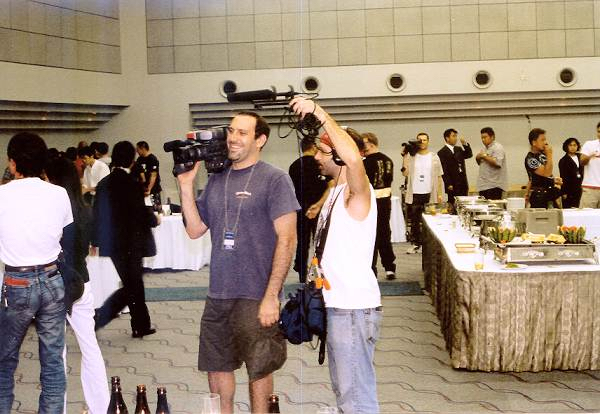
So… this one is a puzzler. Most people who see it won’t have seen the doc, if they even know there is one. For me, knowing it was distracting, but I also wondered if someone who hadn’t seen it might find it a little hard to follow the events, without being able to put their finger on what exactly is weird about the storytelling. But I would say I like the movie, or at least the experience of watching it. I keep thinking about it. It looks good. I love the score by experimental jazz musician Nala Sinephro, and some of the needle drops. The opening credits seemed to me like some sappy late ‘70s boxing drama, but it turns out to be a song called “You Can Never Come to This Place” by Japanese guitarist Masayoshi Takanaka, from the 1981 album The Rainbow Goblins, based on a children’s fantasy book. Great find.
I like that most of the cast is made up of fighters, and Blunt (who has acting as her day job) is also good. I give them credit for not softening her character too much – she’s more sympathetic than in the documentary, but only because the theme of her distracting Kerr from his goals isn’t underlined as much and they skip the part where they break up and then she shows up again like fuckin Michael Myers. Here I see her pain and understand why his dedication to the sport makes the relationship hard for her, but I’m glad they didn’t do what the trailer made me expect, which is change it to a love story when it was more of a my-girlfriend-is-the-absolute-worst type of deal.
Of course the main attraction is The Rock suddenly waking up to the smell of what The Rock is cookin after being asleep at the wheel for quite some time. I’d pretty much accepted he was gonna stay in a ditch forever, but here he starts Tokyo drifting, doing side wheelies, going off jumps. I’m so happy to see him actually hungry and striving in an acting role, and I think he’s genuinely great in it. Instead of just enjoying the comfortable presence of his persona we’re actually interested in watching this character, seeing what he’ll do.
The Rock was the first person I ever heard refer to himself as a “brand.” He’s one of those guys whose first language is motivational speaker quotes, talking about greatness and excellence but using a different definition for those things than I would. He didn’t seem to care as much about being the actual best as just being the biggest, the most famous, the most celebrated, the most profitable. So I hope he sees the parallel here when Mark is talking about seeking the high of the biggest crowd. The Rock was seeking that high when he announced the impending restructured hierarchy of the DC Universe, then he was perceived as losing, like Kerr did. Though he tried to argue it to a no contest.
Kerr found a way to live without either of the highs he was so addicted to, a humbler life apparently not worthy of inclusion in his own biopic, but I’d say there’s a good chance it’s a healthier, more sustainable one. There are plenty of ego reasons for The Rock to do a smaller movie that’s gonna get him critical acclaim and awards speculation, but I don’t hold that against him. I respect that, at least this one time, he stopped trying to fight Superman and made a smaller movie with a good director, aimed at a much smaller crowd. I hope the shitty headlines about it being his smallest opening ever don’t get to him. Shut up you dumb fucks, this is his chance to be The People’s Champion of the Arts.


























October 9th, 2025 at 6:57 am
people are out here writing headlines about how little this film made when Southland Tales is a film that empirically exists in recorded history? the rock will be just fine